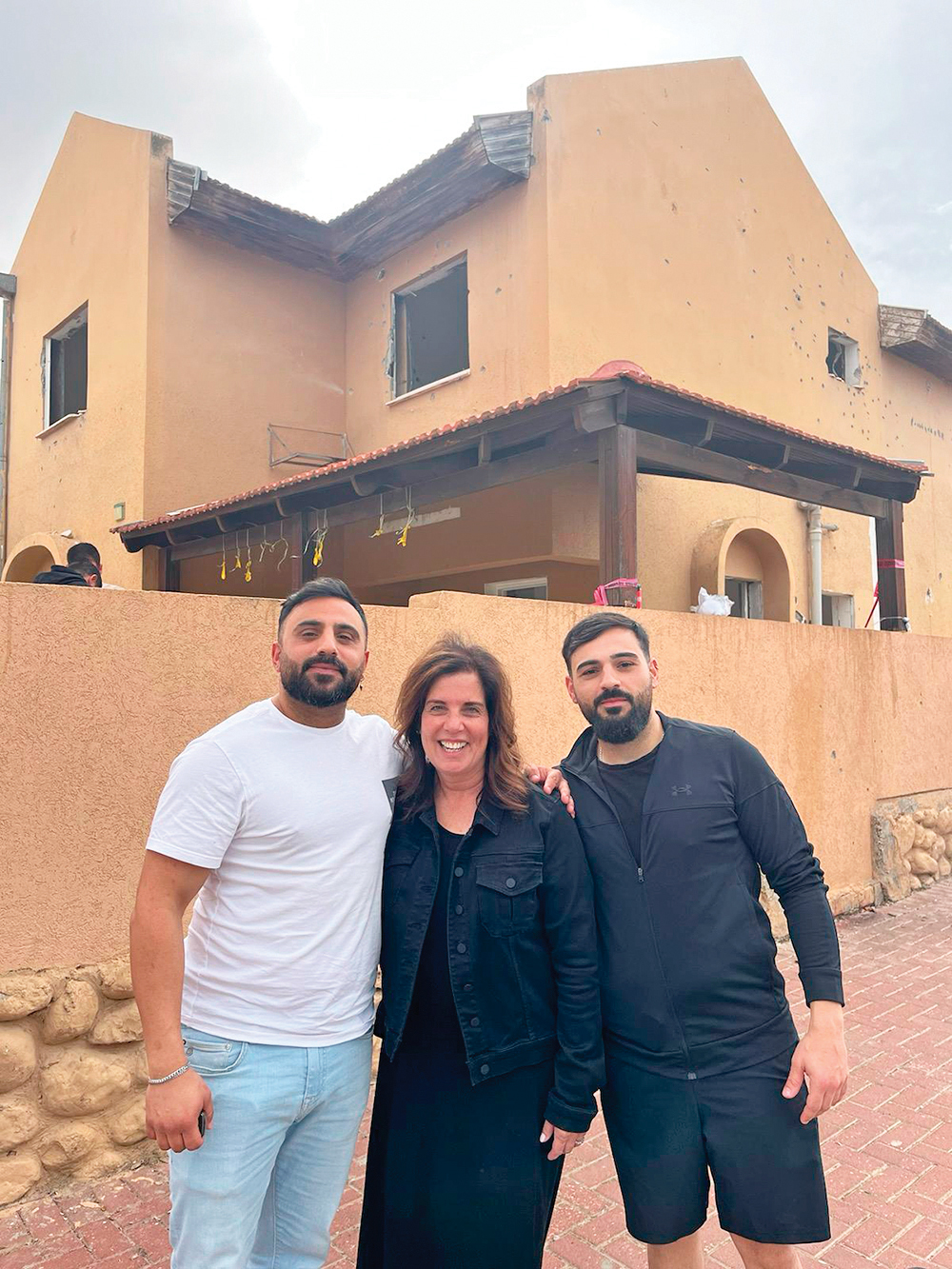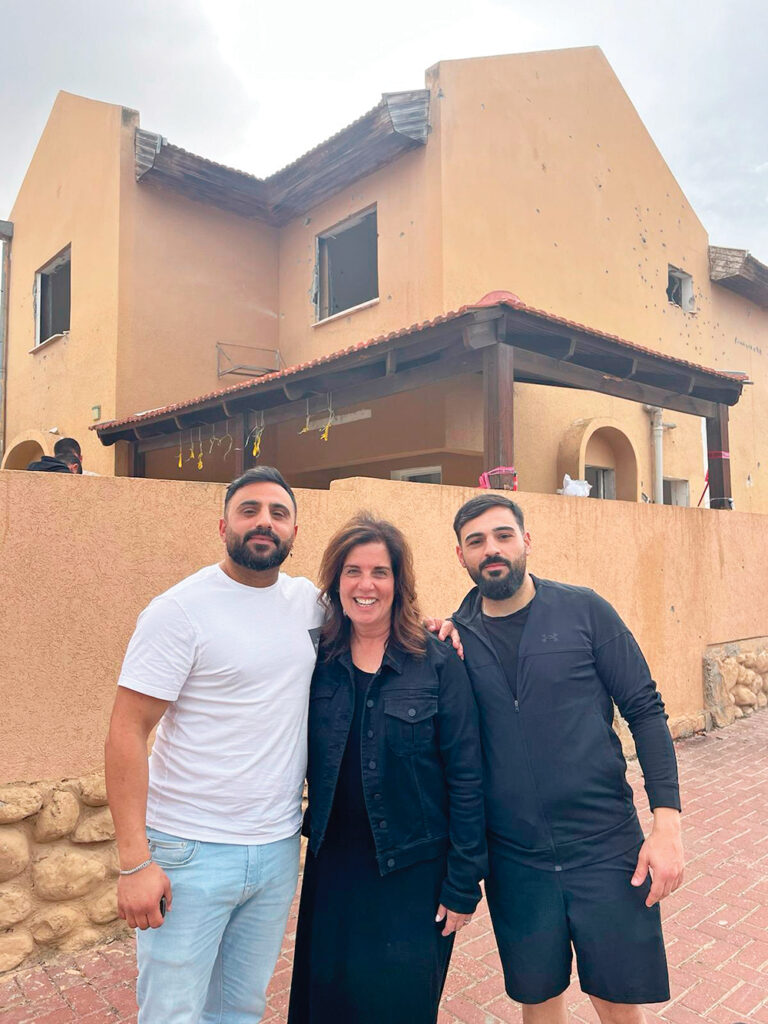
I visited Israel twice in the last four weeks, and chose not to join a formal mission because I was on a personal mission. Having worked as a psychologist for over 30 years in various roles and with many different populations, I was eager to engage with the people who were impacted by the events of October 7. I reached out to several organizations and individuals providing mental health services and offered to help.
Spending the day with Rabbi Ellie Rothstein, the executive director of Kav L’Noar, a nonprofit social services organization, provided a unique perspective on some of the mental health services that are occurring daily. Kav L’Noar offered therapeutic services to adolescents and their families prior to October 7. Following the attacks, Rabbi Rothstein and his team met with the heads of the municipalities and businesses, and developed group therapy opportunities on the kibbutzim and in the factories in the South. Kav L’Noar has been running weekly group therapy sessions with the leaders of the communities, employees and residents who are trying to rebuild their lives, and I had the opportunity to meet many of these individuals.
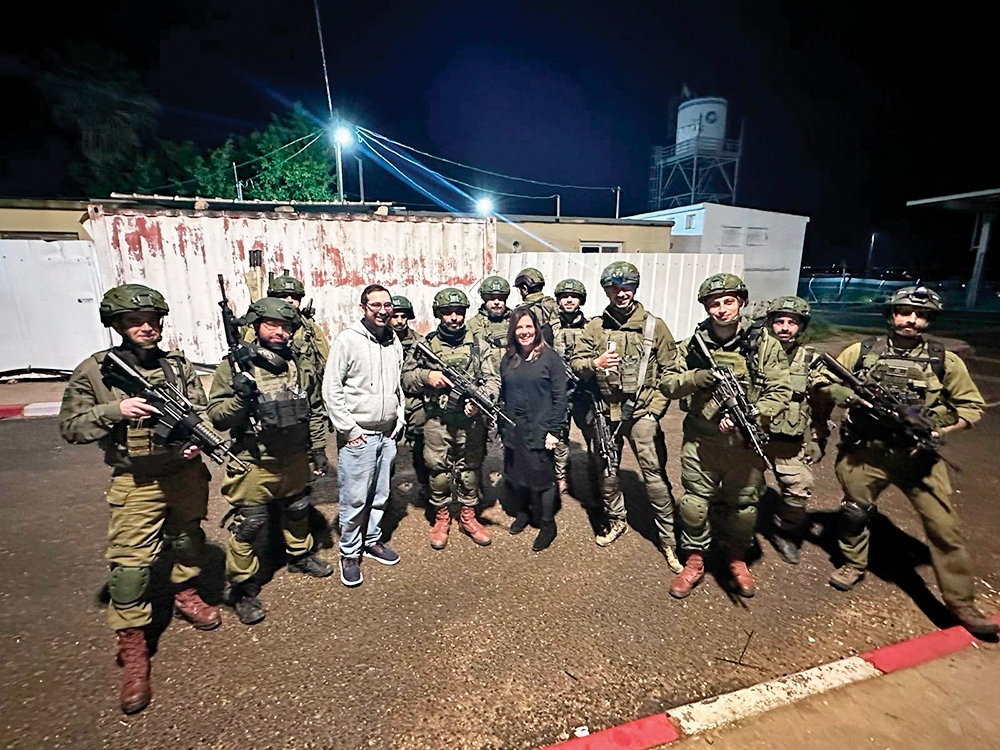
We visited South Up, an independent nonprofit startup promotion association, where we met Rafi Nevo, who is responsible for innovation and investments for the kibbutz industry association. He discussed the many people in the local kibbutzim who live and work in the same area, and said, “Everyone from the top down is struggling.” The support they are receiving from Kav L’Noar is helping them to “normalize their lives.” Nevo conveyed that as a leader, he is dedicated to regaining his prior level of functioning, and he plans to use the financial, social and emotional lessons learned from the attacks of October 7 “to improve the lives of the people and businesses in the area.”
Next, we visited the Nirlat paint factory in Kibbutz Nir Oz, one of Israel’s leading manufacturers of decorative paints and industrial coatings, which was set on fire on October 7. The factory leaders were unable to get to the area and when they returned after five days, they found that the factory sustained damages that are valued at 300 million shekels. Rachamim, a factory manager, shared that 80% of the factory was destroyed, and in addition to the structural damage, extensive looting occurred as Palestinians came on carts and stole everything that was not destroyed. “These were people,” he pointed out, “not terrorists, who live right beside us.” These people “do not have the same values that we have, that you must not kill, and you must not steal.” The factory “is not a business, it is a family,” he continued, and this is causing him to experience survivor’s guilt. “There is an intense emotional bond in our work family, and I lost many people in my family that day.”
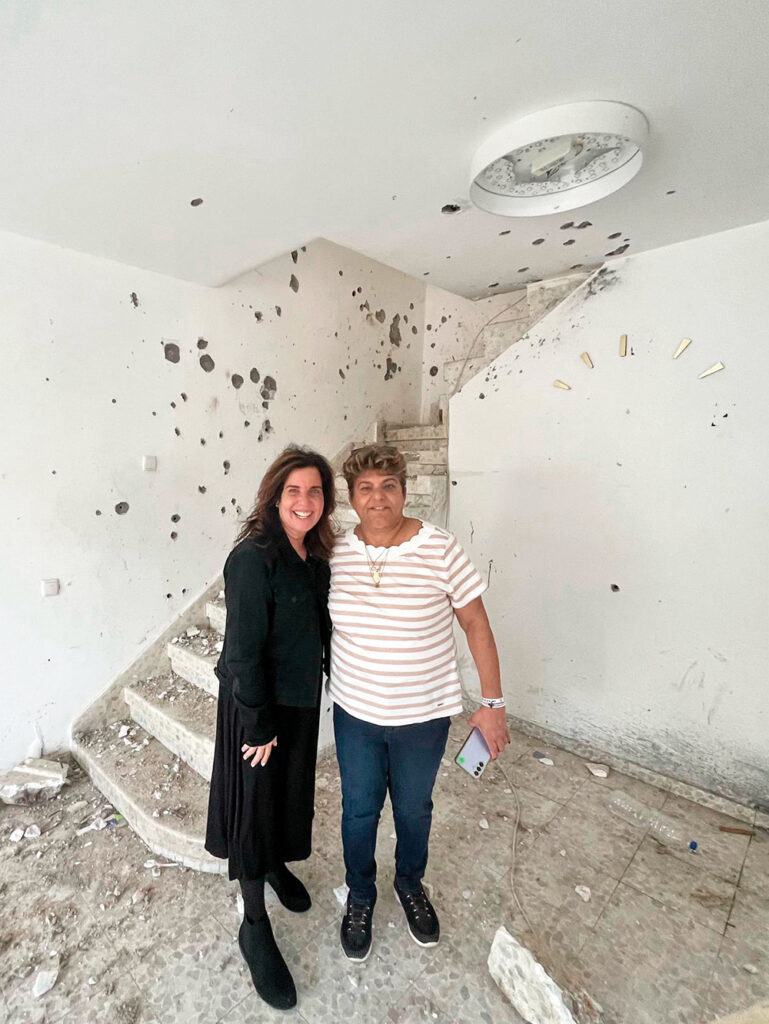
The head of security and safety for the factory, Ofer, said that “as a nation, we are not afraid.” He shared that the leaders of the factory are meeting to plan for the future. “This is how we deal with destruction; we rebuild.” Or Tal, the head of human resources, spoke about her personal experiences that day and informed us that she is committed to helping every factory worker, including those who “cannot come back to work with us, because of the trauma” to find a new job. “They’re lives won’t be normal,” she said, but going back to work is “a part of the healing,” and she is committed to making sure that every employee will be able to live and work again.
As we walked through the factory, the employees directed our attention to the proximity of the factory to the Bibas family home. They informed us that they were able to find footage on the factory’s security cameras of people entering the kibbutz through the factory’s fence where they took Shiri and her children. People came into the factory that day to “kill us, and we will never feel safe knowing that they are in our backyards,” they said.
At our next stop, Natasha, our guide at Beeri, who moved from Australia 33 years ago, told us about her “mother’s intuition” that led her to send her husband to get her daughter from the apartment she lived in with friends, when their dog barked uncontrollably and her daughter called to say she saw men on a motorcycle wearing bandanas. As she choked back tears, Natasha shared that her daughter survived, but several of her friends were killed. These teens all grew up together, and she is trying to deal with her decision to retrieve only her daughter. Natasha and her husband raised their daughters to believe that they can “coexist within this close proximity to Gaza,” she stated. Though there have been many terrorist attacks, and “rockets have been falling on us for years, we wake up every morning and go to sleep every night believing that we are safe, because otherwise we could not function.” She added, “And we will continue to function in this area because this is our home.”
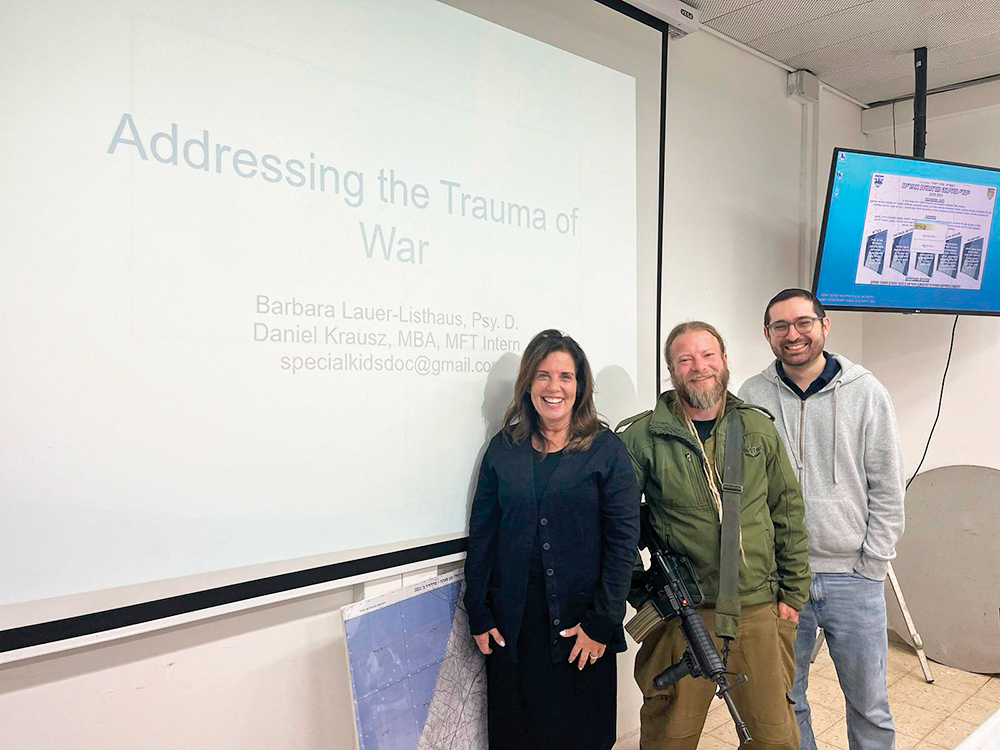
Our final stop that day was at Kibbutz Erez, where we met Orna and Asher Naim. Through tears, Asher shared the story of his son Amir’s intuition when he saw “unusual activity” at Erez Junction and called his friends for backup. He told us that there was a plan to build a factory in the area just below the kibbutz that would have provided employment for many people living in Gaza, but “I don’t know what will happen now.” The army told the members of the kibbutz to return their weapons to the bases, “for safety reasons,” Orna informed us, but many refused, and her son together with three others defended the kibbutz during a four-hour battle, with the weapons they had and additional ammunition that two residents from another kibbutz brought over. She told us about a nurse who drove the injured to the hospital, and was fortunate to find an ambulance on the way. “It was a miracle,” she said, “that only our son died that day.”
In the beginning of February, I met Rachel and David A”H Edri, together with their sons Evyatar and Tal, and their daughter, Chanit, when they visited Miami for a presentation through the Gush Etzion Foundation. (David passed away on February 26, after surviving being held hostage with his wife Rachel on October 7.) When we met, Rachel asked me to come to her home in Israel to see, rather than hear, the extent of damage that occurred so that I could understand the impact on their lives. When I arrived at their temporary home, Rachel immediately went to the kitchen to set out drinks and cookies, as she had when the terrorists were in her home. Evy said that he is “trying to go back to his life,” and he wants the strong, and funny, mother he had prior to October 7. Through laughter and tears, Rachel shared stories about working at the canteen on Tze’elim army base for 43 years, and the many soldiers she helped over the years. Every day, when she hears about soldiers who are being killed in the war, she said, “it feels like I’m losing another child.”
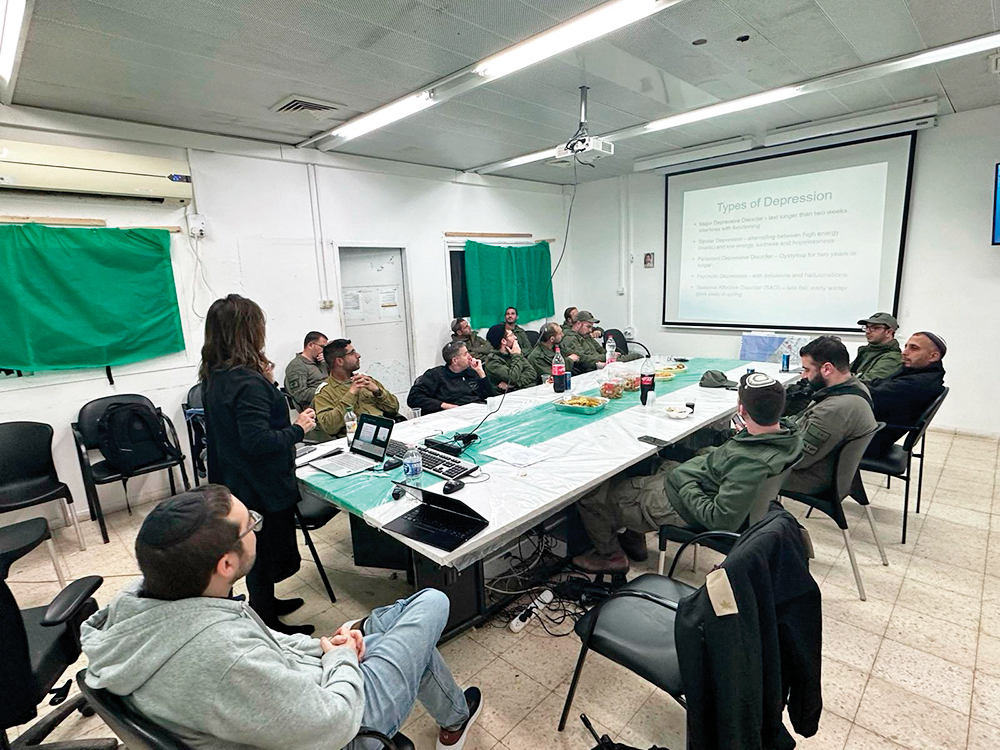
We walked through the Edri home, which is already in the process of being rebuilt, and Rachel pointed out the many reminders of October 7. She is determined to move back to her home and would not consider living anywhere else. Rachel told me that she believes the terrorists chose her block because she lives in an area with older homes, and explained that the terrorists were aware that these homes do not have safe rooms. Rather than entering the homes, she explained, the terrorists stood outside, near the bomb shelters where they knew people would run, and they killed her neighbors as they ran for safety. She told me that the government is helping them rebuild, however the homes will be rebuilt as they were prior to the attacks, which means that they won’t have safe rooms. She doesn’t know why the
terrorists entered her house, or how she survived, but she is determined to help her neighbors raise money so that they can all add safe rooms when they rebuild.
Those were a few of my many experiences on the first trip, and last week, I returned to Israel with Daniel Krausz to speak to army officers about mental health issues associated with trauma, so that they could disseminate the information to the 600 soldiers who are part of Yakir army base, near Karnei Shomron. Their commander, Daniel Jacob, invited us to meet with his officers to help them identify the problems they and the soldiers are facing. As we spoke to the officers in a mix of Hebrew and English, their commander summarized many of our points in Hebrew to reinforce the message but stopped the presentation when we discussed the importance of taking care of yourself, to be able to help others. I told the group that it is not their responsibility to take on the emotional burden of their soldiers, but rather to be there to support them, to listen and to help identify those who may be at risk. Daniel Jacob emphasized that while in all other aspects of leadership within the military, they must always make sure that their troops are fed and protected first. With regard to mental health needs, they must first take care of themselves, and then they can help others.
There are many other stories, including spending time speaking to those whose family members were or are being held hostage; the brave soldier who spoke to us from his hospital bed, and shared that he believes he was saved so that he can influence other American families, like his own, to consider making aliyah; and the taxi driver who cried as he spoke about finally dealing with the emotions associated with losing his 17-year-old daughter to cancer three years ago. He said he had “no emotions” when she died, and he feels guilty that he is sad every day since the attacks. He considers himself fortunate because he was able to spend time with his daughter before her death, whereas the parents of the many young victims of October 7 were unable to prepare. He hopes to be able to encourage other fathers who are going through trauma now to deal with, rather than avoid, the difficult emotions.
The most remarkable aspect of each of these conversations is that these survivors conveyed a plan to help change or improve the experiences of others based on the lessons they learned. Many are familiar with the stages of grief, and that the final stage includes acceptance. Though it seems that these individuals are in that final stage and are looking for ways to move forward, most are in earlier stages of grief and are conveying an absence or avoidance of emotion. On a cognitive level, though, they are existing day-to-day because they have a mission, a plan, a purpose, either to continue to improve the world for the sake of those they lost or those who were left behind. There are so many lessons we can and will continue to learn but the underlying message that was shared is that they will continue to exist, live and rebuild, and they will survive.
This Sunday evening, the MetroWest Israel Action Committee and the Gush Etzion Foundation will be hosting “An Evening of Heroes” at JKHA/RKYHS at 7:30 p.m., during which Rachel and Evy Edri, Orna and Asher Naim, together with Michal Greenglic, Mordechay Shenvald and Shlomo Hammer will be sharing their heroic stories of survival. The fee for admission is $18. To register, go to http://tiny.cc/heroevent.
Barbara Lauer-Listhaus, Psy.D., has worked as a licensed psychologist with individuals facing medical crises and emotional trauma, as well as those who were serving in active duty in the U.S. Navy. She has practices in Hackensack and Livingston. New Jersey. She is also a proud member of the MetroWest Israel Action Committee.


